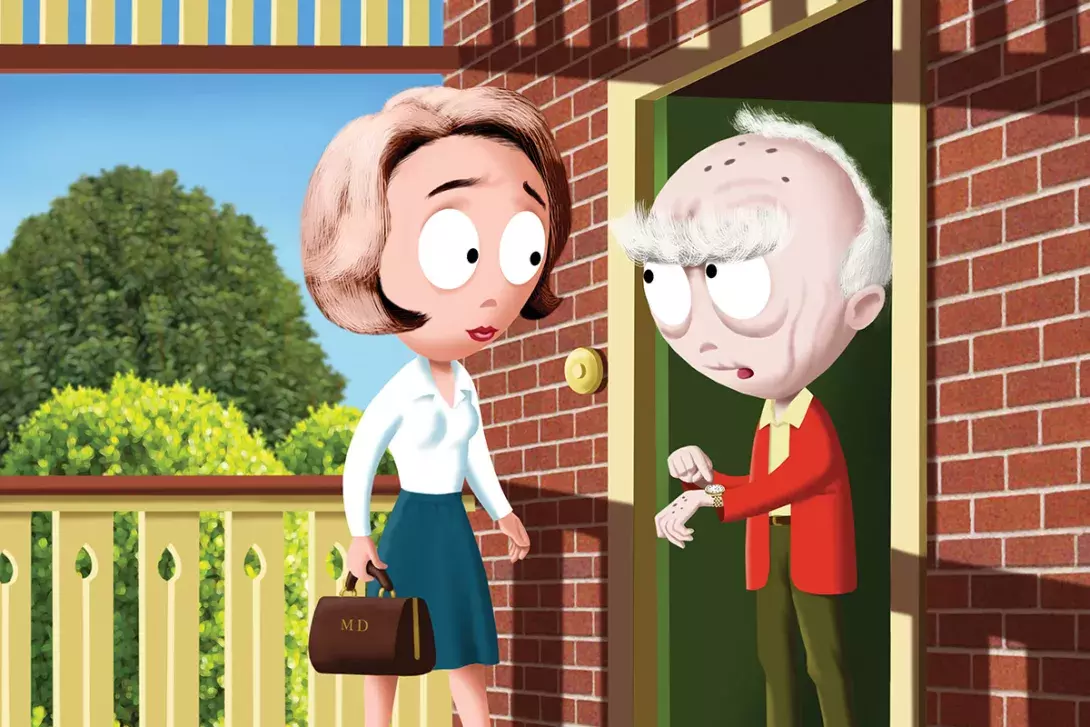The home visit

A GP reflects on lessons you don’t learn in medical school and the value of a disappearing practice.
‘Hello, Mr Potts. It’s the doctor.’
He is one of the few patients I always refer to as ‘Mr’. He is 95 and old school. He is also one of the patients I see at home, once a month.
I hear fumbling at the door, a grunt or two.
He frowns and his eyebrows join like two hairy caterpillars in the middle of his forehead. He points to his watch. ‘You’re late.’
‘I’m sorry. I got caught up at the surgery.’
Mr Potts is a man of such meticulous habits, you could set your clock by his schedule. He frowns. ‘I didn’t know whether to put my lunch in the oven and now my whole day is out of kilter.’
We sit in his lounge room. Unchanged, I’ll wager, since Nancy died 22 years ago. I open my black doctor’s bag. I always feel like Mary Poppins when I pull out my tools of the trade. I am tempted to pull out a tape measure and hold it against Mr Potts: ‘Disgruntled, could improve his manners’.
He survived lymphoma in his 40s, bowel cancer in his 50s, and has had two heart bypasses. He has prostate cancer but is doing well. I suspect he has the staying power to outlive me.
Seeing through his gruff exterior, I am fond of him. I know he appreciates my monthly visits despite his consistent grumpiness. He is always keen for me to book next month’s visit when I leave.
The GP’s home visit has become a rarity. It is time-consuming and you don’t have the luxury of access to equipment, a nurse and all the other things you take for granted at the surgery. However, you can learn a great deal about people when you see them in their own environment. When I noticed things starting to slide with Mr Potts, I had a word to our community nurses, who arranged cleaning, shopping and a Webster pack for his medications. It meant he can stay in his own home, hopefully to the end.
I still remember a patient from years ago when I was inexperienced but full of head knowledge; all those lists I had learnt by heart coupled with a fear of missing a diagnosis. Doris was in her 70s and always wore a feathered hat, a tartan jacket and black gloves. She was unfailingly polite and had few medical issues aside from high blood pressure. She came on the wrong day once or twice, but I thought nothing of it. Her daughter rang me one day and advised me that her mum was ‘losing her marbles’. She wanted support getting her mother’s affairs sorted, assistance moving her to a nursing home. I was immediately suspicious and imagined Doris living in a grand home, the daughter hoping to benefit from the estate. I resisted and kept seeing Doris for her medical check-ups.
Six months later, the practice manager asked me to drop in on Doris on the way home. She had fallen and a neighbour had called. I arrived at a very ordinary three-bedroom weatherboard. The kindly neighbour let me in. The first thing that struck me was the stench. It was hard to put into words. I can still smell it years later.
Every surface was covered with things. Dishes dirty with congealed old food, yellowing newspapers, rags, filthy clothes, a soiled bedpan. Doris lay crumpled on the floor her leg bent at a funny angle. She moaned. I sent silent apologies to her daughter and wished I had listened to her concerns about her mother’s declining cognition.
I knelt and breathed through my mouth. ‘Doris, it’s the doctor. We need to get you to a hospital.’
She looked at me, confused.
‘Doris, can you tell me what happened?’
She stared at me, her eyes dull and then her toothless mouth lifted into a smile. ‘Doctor?’
She looked relieved. ‘I have a sample for you.’
She tried to get up, and I gently restrained her.
She pointed up to the table cluttered with detritus. There in a tall spaghetti jar was a long stool, the cork stopper firmly in place. I tried not to gag.
‘Take it,’ she insisted.
After the ambulance came, I wondered whether to leave the carefully prepared sample, but carried it to the car, hoping no one would see. I called the daughter and apologised. She lived three hours away but came immediately. After discharge, Doris moved to a nursing home close to her family.
There are things you don’t learn at medical school and that are not found in textbooks. The home visit is an underrated educational tool.
Mr Potts soldiers on. His prostate cancer is reviewed twice yearly by a urologist who assures me that a wait-and-see approach is best. I suspect, like me, he thinks Mr Potts will stare it down and outlive it.
I knock. ‘It’s the doctor.’
He lets me in. It’s a week before Christmas.
‘I have something for you’, he announces.
I am surprised and pleased. It is unexpected.
He hands me a dusty bottle. A whisky. It looks expensive and I wonder if it is appropriate to take it. We are not supposed to accept gifts valued at more than $50. I don’t want to offend him.
‘Someone gave it to me years ago. Can’t stand the stuff.’
I check his blood pressure and listen to his heart. I take the bottle, confident I am not breaching any protocols.
‘Merry Christmas, Mr Potts. See you in the New Year.’
You do learn a lot about patients on a home visit. Some of it is challenging to put into words. MT
